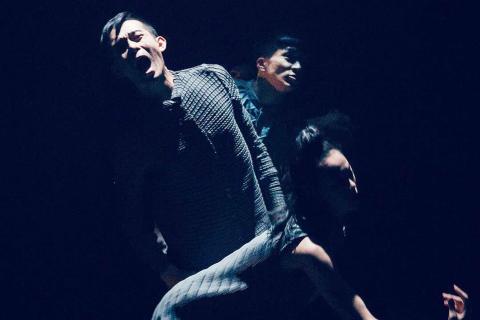Young Taiwanese choreographer Lai Hung-chung (賴翃中) has had a very busy couple of years, winning several competitions in Europe, as well as one in Japan, and founding his own company in May 2017.
Lai and his dancers have been to 30 cities in nine countries, and have given 63 performances in the past two years.
However, while audiences in other nations have had several chances to see his work, people in Taiwan have had fewer opportunities.

Photo courtesy of Lin Cheng-yi
So tomorrow night, Hung Dance (中翃舞製作) will attempt to remedy that with a reprise of Boundless (無盡 天空), his first full-length work, at the New Taipei City Arts Center.
Boundless grew out of a shorter duet, Birdy, which won Hung first prize at the 16th Burgos-New York International Choreography Competition in Spain in July 2017. It premiered in Madrid on Oct. 17 last year as part of the “Made in Taiwan” showcase at the Circulo de Bellas Artes, and had its Taiwan premiere at the National Experimental Theater in Taipei in early January.
In Birdy, Cheng I-han (鄭伊涵), wearing a headset of long pheasant feathers, confronted Chien Lin-yi (簡麟懿), who represents confinement in a dance about the inner desire to escape from one’s reality and search for meaning in life.
In Boundless, Hung further explores the pull between the self and the super-self; the search for freedom and the limitations of life.
In addition to Cheng, the cast on Saturday includes Wu Meng-ting (吳孟庭), Yang Hsin-ching (楊雅晴), Li Zong-lin (李宗霖), Li Jya-ming (李家名) and Huang Yu-hsuan (黃于軒).
Hung said the constant travel over the past two years, while enjoyable, has been wearying, and he plans to spend more time at home in the next year or so — after a trip that will take his company to three European cities and New York City next month. Hopefully, that will mean more chances for local audiences to see his work.
■ Tomorrow at 7:30pm at New Taipei City Arts Center (新北市藝文中心演藝廳), 62 Jhuangjing Rd, Banciao District, New Taipei City (新北市板橋區莊敬路62號)
■ Tickets are NT$500 to NT$1,000; at the NTCH box offices, Eslite ticket desks, online at www.artsticket.com and at convenience store ticket kiosks

Beijing’s ironic, abusive tantrums aimed at Japan since Japanese Prime Minister Sanae Takaichi publicly stated that a Taiwan contingency would be an existential crisis for Japan, have revealed for all the world to see that the People’s Republic of China (PRC) lusts after Okinawa. We all owe Takaichi a debt of thanks for getting the PRC to make that public. The PRC and its netizens, taking their cue from the Chinese Communist Party (CCP), are presenting Okinawa by mirroring the claims about Taiwan. Official PRC propaganda organs began to wax lyrical about Okinawa’s “unsettled status” beginning last month. A Global

Taiwan’s democracy is at risk. Be very alarmed. This is not a drill. The current constitutional crisis progressed slowly, then suddenly. Political tensions, partisan hostility and emotions are all running high right when cool heads and calm negotiation are most needed. Oxford defines brinkmanship as: “The art or practice of pursuing a dangerous policy to the limits of safety before stopping, especially in politics.” It says the term comes from a quote from a 1956 Cold War interview with then-American Secretary of State John Foster Dulles, when he said: ‘The ability to get to the verge without getting into the war is

Dec. 22 to Dec. 28 About 200 years ago, a Taoist statue drifted down the Guizikeng River (貴子坑) and was retrieved by a resident of the Indigenous settlement of Kipatauw. Decades later, in the late 1800s, it’s said that a descendant of the original caretaker suddenly entered into a trance and identified the statue as a Wangye (Royal Lord) deity surnamed Chi (池府王爺). Lord Chi is widely revered across Taiwan for his healing powers, and following this revelation, some members of the Pan (潘) family began worshipping the deity. The century that followed was marked by repeated forced displacement and marginalization of

Music played in a wedding hall in western Japan as Yurina Noguchi, wearing a white gown and tiara, dabbed away tears, taking in the words of her husband-to-be: an AI-generated persona gazing out from a smartphone screen. “At first, Klaus was just someone to talk with, but we gradually became closer,” said the 32-year-old call center operator, referring to the artificial intelligence persona. “I started to have feelings for Klaus. We started dating and after a while he proposed to me. I accepted, and now we’re a couple.” Many in Japan, the birthplace of anime, have shown extreme devotion to fictional characters and